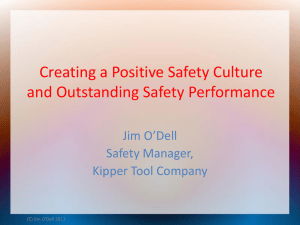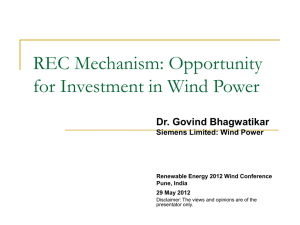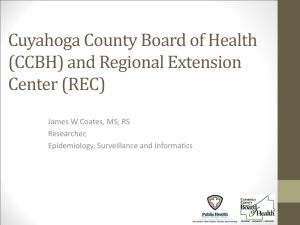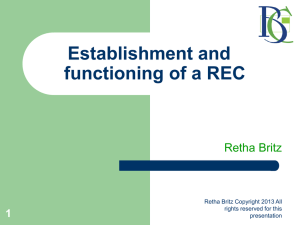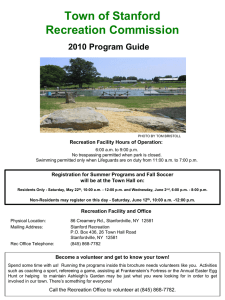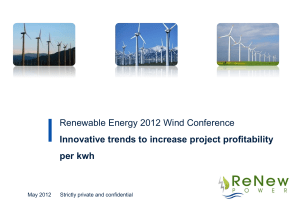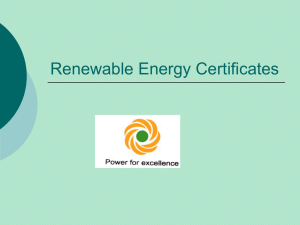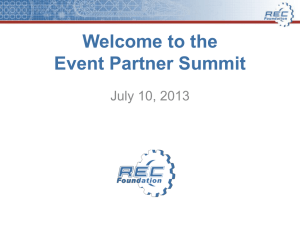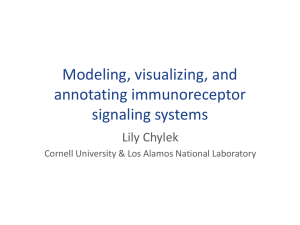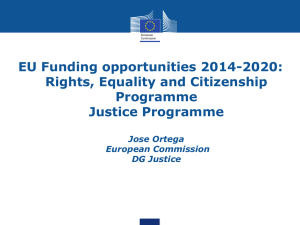Capacity Building and Knowledge
advertisement
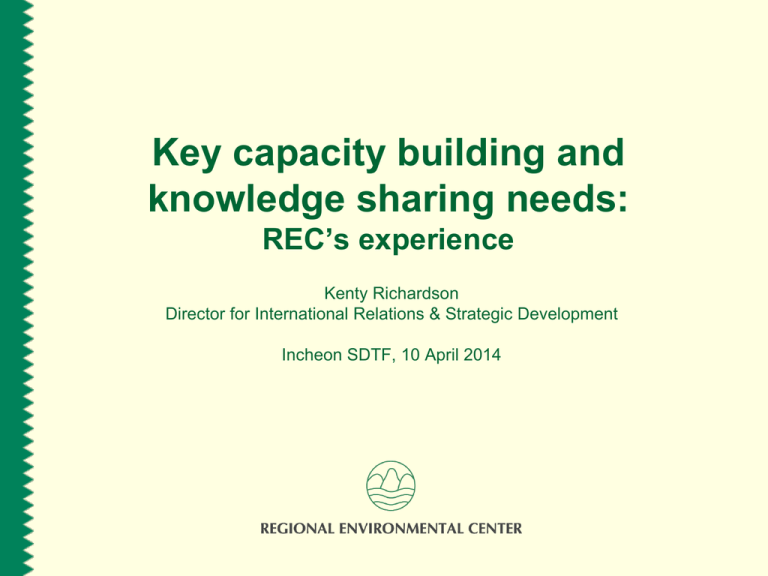
Key capacity building and knowledge sharing needs: REC’s experience Kenty Richardson Director for International Relations & Strategic Development Incheon SDTF, 10 April 2014 Outline of the presentation • REC presentation and role in capacity building, and governance for SD, preliminary thoughts • Capacity building and knowledge sharing needs Implement effective and efficient multi-stakeholder bodies • Collaborate more directly across levels of government for planning and scaling up implementation • Scale up implementation through the design and implementation of cross-cutting policies and programmes • Prepare monitoring, reporting and accountability • Final thoughts www.rec.org Regional Environmental Center (REC) • • • • An international organisation with a mission to assist different interest groups in addressing environmental issues and promote sustainable development in CEE and beyond Legally based on a charter signed by 31 countries and the European Commission Offices in 17 countries, approx. 160 staff members 100% project-financed organisation • over 200 running projects • annual turnover 10-12 MEUR • Operations in: • EU Member States in CEE • EU enlargement countries, candidate and potential candidate countries • Eastern Partnership Countries • EU27 • beyond the REC Country Office network www.rec.org Potential REC services – REC competencies • Coordination and management of complex environmental related projects (including international secretariats) • Neutral platform • Mission driven approach • Transparent, flexible implementation • Specific support in the drafting of national strategies and programmes for the implementation of the Europe 2020 Strategy • Research • National and regional coordination • Civil society support • grants • capacity building • Policy briefs; good practices; integrated policy guideline documents • Stakeholder involvement • cross-sectoral governmental bodies and agencies, • e.g. ministries like environment, energy, housing, transport, agriculture, health, water, climate change, forestry innovation & employment • the business sector, the finance community • civil society • academia • media • Capacity building • organisation of complex and comprehensive seminars and workshops at the national and regional level www.rec.org Capacity building and knowledge sharing needs in mainstreaming SD into planning • Philosophy of the REC: series of practical steps that make difference • Not a substitute to SD councils that are top down but work on deliverables bottom up. How we can better articulate this top down with bottom up approaches? • Inter-institutional cooperation very important; vital role of competent experts • Achieving sectoral integration in practice, vertical and horizontal • Participation and contribution of the environmental stakeholders in all bodies at all levels • Capacity building of environmental stakeholders at all levels to be supported – central and local governments, NGOs, businesses, media, academia • Examples of REC activities www.rec.org Implement effective and efficient multi-stakeholder bodies Key examples — Rivers in focus • Danube • NGO Participation in the Danube River Basin Management Plans • Building Environmental Citizenship to Support Transboundary Pollution Reduction /Pilot Project in Hungary and Slovenia • Danube National & Regional Grants • Enhancing Access to Information and Public participation in Environmental Decision Making, Danube Regional Project • Tisza • Tisza River Basin Integrated Sustainable Dev. Programme Planning and Initiation Phase • Tisza follow up grants - NGO workshop: response in crisis situation • Sava / Drina • Support to the International Sava Basin Commission Initiative • Enhancing cross border cooperation in the Drina River Basin www.rec.org Implement effective and efficient multistakeholder bodies: lessons learned REC as neutral platform secretariat of national round tables in nuclear energy and nuclear waste management (voluntary basis with difficulties) Now emerging community of practise around on public participation (PP) in nuclear energy policy and nuclear waste management at EU level promoting PP as a component of transparency and safety www.rec.org Collaborate more directly across levels of government for planning and scaling up implementation • SECTOR, SENSE and SENIOR programes supporting CSO’s to become active and powerful actors in the local and national SD context. • GREEN PACK introducing SD in the curricula as a tool for the overall educational reform www.rec.org Key example: STREAM • Strengthening Local Environmental Planning and Environmental Civil Society in Belarus and Moldova during 2012-2014 1. 2. Financial support from SIDA, with budget of 5.3 MEUR; 2014 final year of implementation Two clusters under implementation: • Supporting Sustainability and Environmental Action Planning in Communities in Belarus and Moldova (LEAP) • Supporting Environmental Civil Society Organisations in Belarus and Moldova (SECTOR) www.rec.org Key example: Green Pack • 2001 with the support of Toyota Motor Corporation, the REC developed a comprehensive environmental education programme in Central and Eastern Europe (Green Pack) • The REC and respective local partners developed a comprehensive environmental education programme special for each country. • A multi-media environmental education curriculum kit • Primarily intended for secondary school teachers and their students • Focus on particular aspects of environmental protection and sustainable development • • 40.000+ teachers 4.500.000+ students In 18 countries…. 20 languages • Current Project – RBF support for Kosovo*, Montenegro and Serbia www.rec.org Scale up implementation through the design and implementation of cross-cutting policies and programmes • Environment and security: nexus water, food and energy security • Resilience and climate adaptation • Climate change mitigation • Health and environment • Transport and environment www.rec.org A unique combination of skills, experiences and networks ENVSEC process Confidence building and action Stage 1: Regional assessments Stage 2: National and regional consultations Stage 3: Regional work programmes Stage 4: Project implementation and lessons learned Key examples: The Impacts of Climate Change on Food Production in the Western Balkans • The publication summarise the knowledge, experience and results acquired in the course of research into the impacts of climate change on crop yields in five countries. • The reports from Albania, Bosnia and Herzegovina, Croatia, the former Yugoslav Republic of Macedonia and Serbia provide examples of efforts to identify risks related to climate change and the main effects on the production of important crops. • The publication highlight the gaps and barriers that central and local governments need to address. • It provides recommendations for decision makers as to the most urgent actions needed to pave the way to incorporating climate change aspects into agricultural development plans and shaping appropriate strategies and policies. www.rec.org Key example: SINPHONIE • School Indoor Pollution and Health Observatory Network in Europe (www.sinphonie.eu) 1. 2. 3. 4. A complex research project covering the areas of health, environment, transport, climate change It aims at improving air quality in schools and kindergartens The project is implemented under service contract of DG Sanco 36 environment & health institutions from 25 countries www.rec.org Key examples: CRESSIDA • Building Local Community Resilience for Sustainable Development in International Watersheds, such as the Drini/Drina river • local governments of those countries that share the watersheds-namely, Albania, Bosnia and Herzegovina, Kosovo*, Macedonia, Montenegro and Serbia • main goal is to create a flexible and easily replicable 'living laboratory' for pilot sustainability tools and practices • capacity-building activities will combine theoretical and hands-on approaches, and also encourage participants engage actively in decision-making processes • Starting in 2014 www.rec.org Prepare monitoring, reporting and accountability processes and institutions for a set of global sustainable development goals that can be translated into national, sub-national and local contexts ? www.rec.org Final thoughts • Many more cross-cutting policies than before • Combine top down and bottom up and learn and connect with grassroots living labs experiences including a clearing house of lessons learned • Step by step approach to move fast on low hanging fruits and upscale them • SD public policies should integrate all available tools from legislation, budget, spatial planning and public awareness raising • SD transition should mainly focus “on connecting people” using the famous ad of this Finnish company and include much more new information technologies and more social media www.rec.org Thank you for your attention & Welcome to the REC! www.rec.org www.rec.org
